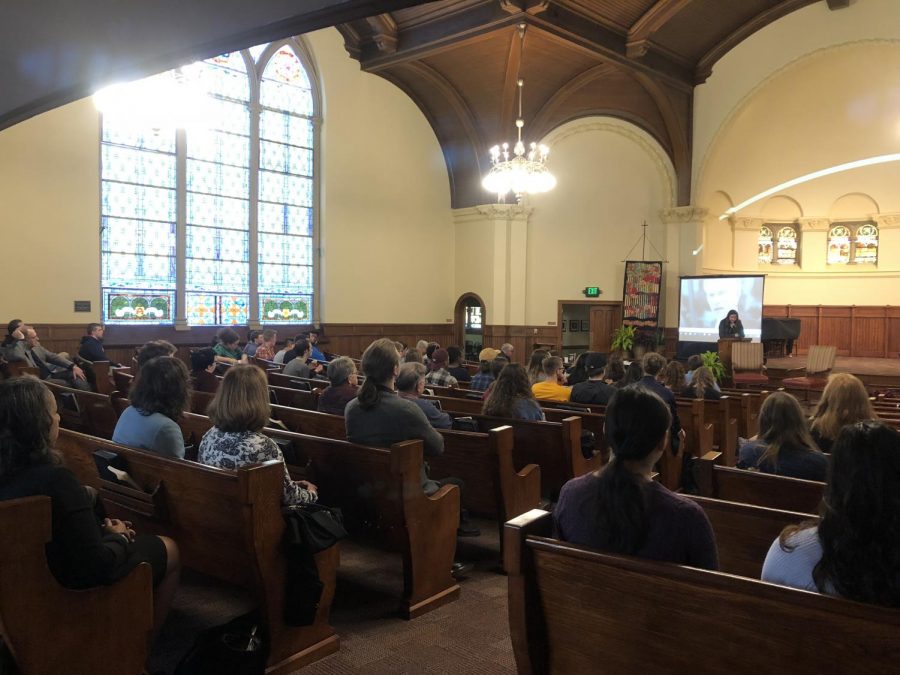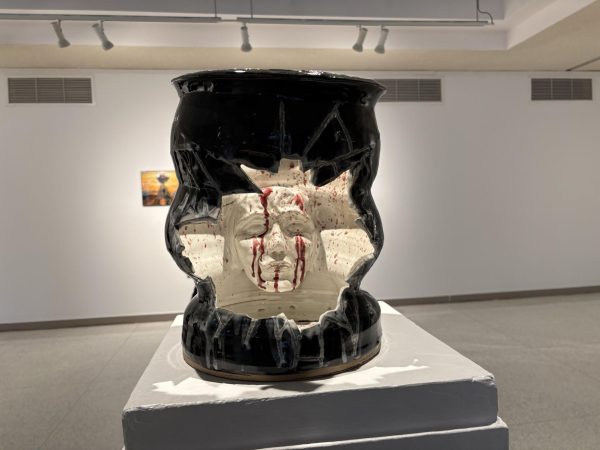Crane offers an in-depth look into international criminal law
Former chief prosecutor shares experiences of prosecuting crimes against humanity
Students and community members gather to watch David Crane speak about his experience prosecuting Charles Taylor on Monday, April 2, 2018 at Ford Chapel.
According to the United Nations, the end of the second world war exposed the need for a judicial body to prosecute war criminals for atrocities such as “genocide, crimes against humanity, war crimes and the crime of aggression.” At the time, the body held the International Military Tribunals to prosecute dozens of Nazi Officials, in addition to dozens more in Tokyo.
More than 70 years later, these atrocities, specifically the crimes against humanity perpetrated upon the citizens of Sierra Leone, were the focus of Crane’s discussion titled “International Criminal Law in a Kaleidoscopic World,” which was held in Ford Chapel on Monday, April 2, and was hosted by the Law and Policy Program and the Center for Political Participation.
“The Soviet Union dissolved in a month,” said former Chief Prosecutor of the Special Court for Sierra Leone David Crane. “The evil empire disappeared. I spent most of my career fighting the evil empire … the world began to adjust with democratic peace, rise of democracies and this was it. This is the Nirvana we had all been waiting for.”
Yet that notion of peace faded away as the world turned its attention to the atrocities being committed in the former Yugoslavia, Rwanda and much of West Africa, according to Crane.
“International Criminal law is the punitive component recently developed in the 90s to hold accountable those who commit international crimes such as war crimes,” Crane said. “When the Soviet Union ended in the 1991 time frame, the Cold War ended, the world seemed to take a deep breath and tried to seek another type of balance related to democracy, but that hasn’t happened.”
What has happened is the rise of nationalistic individuals coming to power, according to Crane. With a lack of international superpowers, the situation has become kaleidoscopic in the sense that “if one thing changes, everything changes.”
Crane was responsible for prosecuting the former President of Liberia, Charles Taylor, for crimes against humanity and war crimes. Taylor was responsible for the deaths of over one million Liberian citizens in his efforts to take control of the country in the late 1990s, according to Crane.
Before becoming Chief Prosecutor of the SCSL, he served in the United States federal government for over 30 years. Currently, he is a professor of practice at Syracuse University of Law and is working to build a case against Basar al-Assad, the President of Syria.
Crane’s visit to Allegheny was the culmination of a short course on international criminal law taught by Associate Professor of Political Science Shanna Kirschner, who planned the event with Chair of Political Science Brian Harward.
“Professor Harward and I, at the end of last semester, started thinking about trying to bring together a set of related speakers visiting campus,” Kirschner said. “We have built those three events into a scaffolding of a short course which is a model that we do across a lot of different departments … Mr. Crane’s visit is the final of those three campus events.”
Among the topics covered in the short course were the history of international criminal law, the establishment of the International Criminal Court, how prosecutions affect future crimes and a number of others according to Kirschner.
An Allegheny alumnus, Greg Peterson, ’73, was invited to introduce Crane and ask him questions about his experiences. Crane’s responses were packed with vivid detail and strategy he emphasized “could not be found in any “law book” or classroom.
“You ultimately signed indictments against 13 people held responsible for these crimes against humans. That was around 2002; how did that operation playout?” Peterson asked. Crane then explained his strategy of “going after the big guy” in Sierra Leone, which was the opposite plan of the Rwanda and Yugoslavia tribunals.
“Their mandates were to prosecute those who did the acts. That’s 100,000 people. No judicial system in the world could prosecute 100,000 people, but to prosecute 23 people, or whatever, [is reasonable].”
In that case, Crane indicted 13 high-ranking government officials in Sierra Leone. He provided an in-depth explanation of his strategy during the discussion.
“In order to do a successful prosecution, it’s not about law,” Crane said. “The key to a successful international prosecution where you’re going after very high stakes, heads of state, powerful [and] deadly human beings, is you have to take in as you decide on your prosecution plan, the effects politically, diplomatically, culturally, practically and legally.”
Crane said this involved trips to other West African and European countries, keeping track of the locations of all indictees, making sure secret information was not leaked to the wrong people and a plethora of other carefully planned steps.
Crane later spoke about the emotional effect on the country after he read his press statement about the indictments.
“There was stunned silence; they just looked at me,” Crane said. “Then the first guy broke, and they all left. They literally cleared the whole office in ten seconds … As we’re driving back to my headquarters, people were starting to spill out into the streets, dancing, hugging each other, celebrating.”
After three years in Sierra Leone and a landmark international prosecution nicknamed “the little engine that could,” which gave justice to the people of Sierra Leone, Crane had to cope with his own emotional stress upon returning to the U.S.
“This has taken the good in life out of me,” Crane said. “We were the only tribunal to essentially work at the scene of the crime … Everyday I woke up and smelled death, tasted death, saw death, and that does affect you. I knew this; we all suffer and I still continue to suffer from PTSD.”
“What got me was I would fly from Freetown to Brussels,” Crane said. “What triggered my first incident of PTSD was walking off the airplane, and walking into a clean, cool airport. The contrast was so stark … To walk into an airport where it’s clean air just triggered an episode for me.”
His PTSD was also triggered after reading the journals he had kept from the experience, according to Crane.
“The horror of it is truly unimaginable, what these people did to other people,” Crane said.
Despite any emotional effects or monetary expenses of the SCSL, Crane emphasised that no cost was too great for “the little engine that could.” The importance of improving the lives of the citizens was always the most important aspect of this mission for Crane.
“What matters is the people of Sierra Leone felt that Justice was done,” Crane said.








